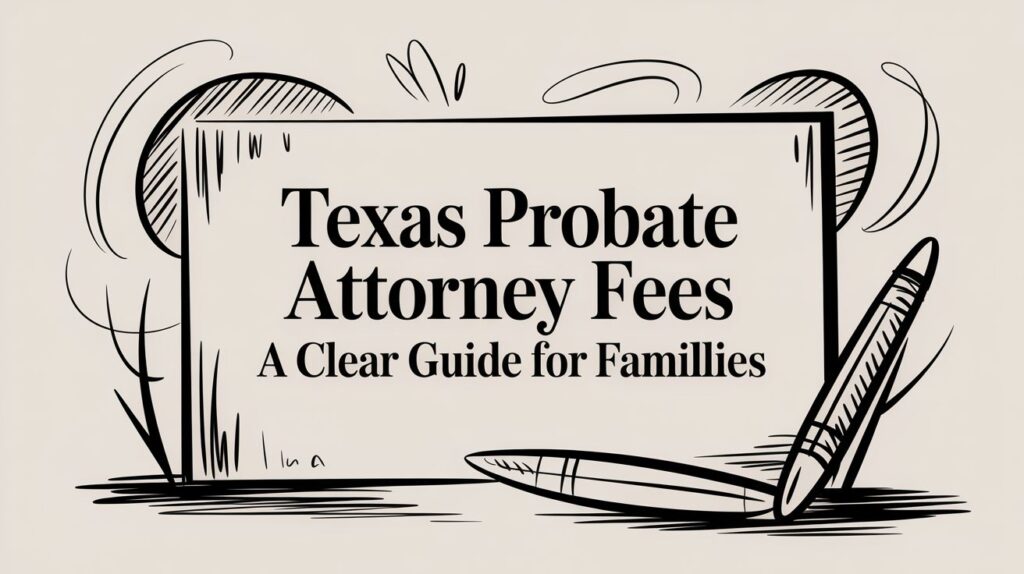If you’ve recently lost a loved one or are preparing your estate, one question that often comes up is: what property is protected in a Texas probate? It’s a fair question—and one that comes loaded with confusion, outdated advice, and flat-out myths. Many people assume that everything goes through probate, or conversely, that everything is automatically shielded. The truth lies somewhere in between, and knowing where that line is can protect your rights, your property, and your family’s peace of mind.
In this guide, we’ll break down what Texas law actually says about exempt property, protected assets, and what can be claimed by creditors. We’ll also explain how real families have handled these issues—sometimes with ease, and sometimes with costly mistakes.

Why Understanding Protected Property in Texas Probate Matters
Probate isn’t just a legal formality—it’s a court-supervised process of administering an estate. Assets are gathered, debts are paid, and the rest is distributed according to the will or state law. But here’s the thing: not all property is treated the same. Some assets are considered protected, which means they’re either exempt from creditor claims, bypass probate entirely, or are reserved specifically for certain family members.
Understanding what property is protected in a Texas probate can be the difference between losing an inherited home to unpaid debts or being able to preserve it for your children. It can also influence how you plan your estate or guide a grieving family member through a difficult process.
The Big Picture: What Texas Law Considers Protected Property
Texas law recognizes certain types of property as exempt from creditors or automatically passing to surviving family members. These categories include:
- Homestead property
- Personal property exemptions under the Texas Estates Code
- Life insurance and retirement accounts with designated beneficiaries
- Certain vehicles and household goods
- Community property passing to a surviving spouse
Let’s dive deeper into each of these and explain how and why they’re protected.
The Homestead: The Most Commonly Protected Asset in Texas Probate
Texas has some of the most generous homestead protections in the country. A homestead is a primary residence—urban or rural—that the deceased used as their permanent home. Under the Texas Estates Code, a homestead is exempt from creditor claims in probate (with few exceptions) and is reserved for the surviving spouse and qualifying minor children.
Key Homestead Protections:
- Creditors cannot force the sale of the home to satisfy most debts.
- The home passes to the surviving spouse outside of probate.
- Homestead protection also applies to up to ten acres in an urban area or 200 acres in a rural setting (for a family).
This is one of the most important answers to the question what property is protected in a Texas probate—because it ensures that a surviving spouse or dependent children are not left homeless due to outstanding debts.
Real-Life Example: Saving the Family Home
After Maria’s husband died suddenly in Houston, she was overwhelmed by medical bills and funeral costs. Creditors started calling. But because their house was their homestead, it was protected from seizure. Maria’s probate attorney helped her assert that claim, and she kept the home—even though the rest of the estate had little to distribute.
Exempt Personal Property Under the Texas Estates Code
Beyond the homestead, Texas law also exempts certain types of personal property from probate creditor claims. The law allows for the designation of property as “exempt property” when the estate is administered.
Examples of Exempt Property:
- Up to $100,000 in personal property for a family (or $50,000 for a single adult). This may include:
- Home furnishings
- Jewelry
- Two firearms
- One vehicle per licensed household member
- Tools or equipment used in a trade or profession
- Certain livestock and household pets
This property is not subject to the claims of general unsecured creditors and is set aside for the use of the surviving spouse, minor children, or dependent adult children.
Retirement Accounts and Life Insurance with Beneficiaries
Another key part of understanding what property is protected in a Texas probate is knowing which assets don’t pass through probate at all. These include:
- Life insurance policies with named beneficiaries
- 401(k)s, IRAs, and other retirement accounts with proper beneficiary designations
- Payable-on-death (POD) bank accounts
- Transfer-on-death (TOD) securities and real estate deeds

These accounts and benefits pass directly to the named beneficiaries by operation of contract—not through the will—and therefore are typically protected from probate creditors.
Real-Life Example: A Grandmother’s Gift That Was Safe
Sandra had named her grandson as the sole beneficiary of her IRA account. After her death, several creditors filed claims in probate. But because that IRA had a direct beneficiary designation, it never became part of the probate estate. Her grandson received the full amount, untouched by debt collectors.
What Community Property Means for Protected Assets
In Texas, community property law can both simplify and complicate the probate process. Generally, property acquired during the marriage by either spouse is considered community property, and each spouse owns an undivided one-half interest.
When one spouse dies, their half of the community property may pass:
- Directly to the surviving spouse (if there are no children from a prior relationship)
- Through the will or intestate succession (if there are children from outside the marriage)
But here’s where it matters for what property is protected in a Texas probate—the surviving spouse’s half of the community property is not subject to the deceased spouse’s creditors. Only the decedent’s half of the community property can be used to pay debts.
Non-Probate Transfers That Protect Property
Texas allows individuals to structure assets to bypass probate entirely. These tools don’t just make probate easier—they help protect property from unnecessary entanglement.
Common Non-Probate Transfers:
- Lady Bird Deeds (Enhanced Life Estate Deeds): Allow property to pass to beneficiaries upon death while retaining control during life.
- Revocable Living Trusts: Remove assets from the probate estate and ensure faster, private transfers.
- Survivorship Agreements on Bank Accounts: Ensure the surviving co-owner inherits the account immediately.
By setting up these tools properly, you effectively designate what property is protected in a Texas probate because it never goes through probate at all.
Common Myths About Protected Property in Texas Probate
There are plenty of misconceptions when it comes to probate protections. Let’s clear up a few big ones.
Myth 1: All Jointly Owned Property Is Protected
Not always. If the title isn’t clear or lacks a survivorship agreement, it could still end up in probate.
Myth 2: Everything in a Will Is Automatically Protected
A will doesn’t override creditor rights or change the classification of property. It only directs how probate property should be distributed.
Myth 3: If There’s No Debt, Everything Goes to the Family
Even small unpaid debts can trigger claims in probate. It’s the classification and legal structure of the property—not the amount owed—that determines whether it’s protected.
Creditors’ Claims and What They Can Reach
Even when you’re asking what property is protected in a Texas probate, it’s helpful to understand what’s not protected. Unsecured creditors can make claims against:
- The decedent’s half of the community property
- Any separate property not otherwise exempt
- Non-exempt personal property over the statutory limits

Secured creditors (like mortgage lenders or car note holders) can foreclose or repossess collateral if payments stop—even if that asset is otherwise exempt from general creditor claims.
How Creditors Must File
Creditors must follow strict timelines and procedures to file claims in probate. This often gives surviving spouses and heirs an opportunity to challenge claims or assert exemptions early in the process.
Steps to Protect Property Before Death
Planning ahead is the best way to ensure your loved ones know exactly what property is protected in a Texas probate and what isn’t.
Smart Planning Strategies:
- Set up a revocable living trust for major assets
- Name beneficiaries on all eligible accounts and insurance
- Draft a valid Texas will with clear language about community and separate property
- File a homestead exemption with your county
- Use Lady Bird Deeds to transfer real estate without probate

An experienced probate attorney can help you build a plan that maximizes exemptions and avoids unnecessary court involvement.
Real-Life Lesson: The Difference One Form Can Make
Tina’s mother passed away in El Paso. While she had a modest estate, the home had no Lady Bird Deed or survivorship agreement. Probate was required to transfer the title—even though Tina had lived there for years. Had her mother taken an extra step to set up a deed transfer, Tina could’ve avoided six months of probate court and over $4,000 in legal costs.
Final Thoughts: What Property Is Protected in a Texas Probate?
So, what property is protected in a Texas probate? The answer depends on how the property is classified, how it’s titled, and whether it qualifies for exemption or non-probate transfer. Homesteads, exempt personal property, beneficiary designations, and properly structured community property all play a key role in shielding assets.
The takeaway is this: Texas probate law provides many protections—but only for those who understand how to use them. Don’t rely on myths or assumptions. Take the time to learn the system, talk with an estate planning attorney, and put legal safeguards in place. Your family—and your peace of mind—deserve that kind of protection.








